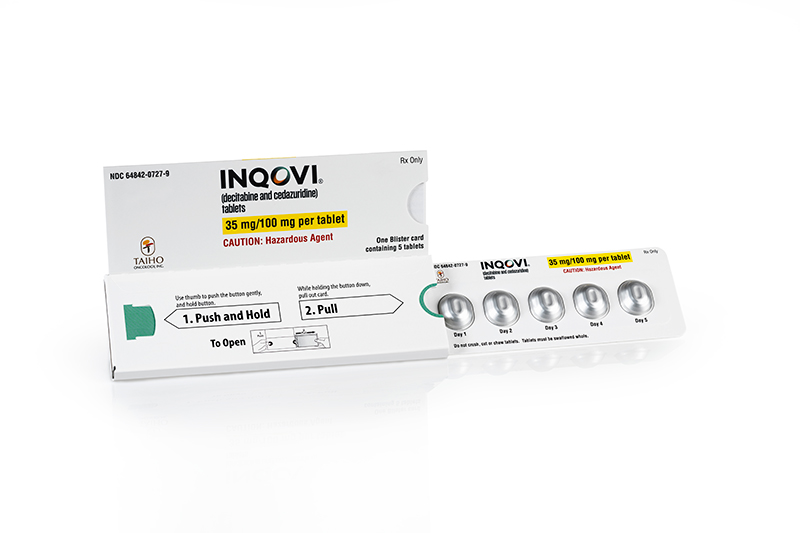Inqovi (decitabine and cedazuridine) vs Vanflyta (quizartinib)
Inqovi (decitabine and cedazuridine) vs Vanflyta (quizartinib)
Inqovi (decitabine and cedazuridine) is an oral hypomethylating agent approved for the treatment of adults with myelodysplastic syndromes (MDS), including certain types of chronic myelomonocytic leukemia (CMML). Vanflyta (quizartinib), on the other hand, is a tyrosine kinase inhibitor specifically targeting FLT3, and is used for the treatment of adults with relapsed or refractory acute myeloid leukemia (AML) who have a FLT3 mutation. The choice between Inqovi and Vanflyta would depend on the specific diagnosis and genetic characteristics of the patient's leukemia, as these medications are not interchangeable and are targeted towards different mutations and conditions within the spectrum of hematologic malignancies.
Difference between Inqovi and Vanflyta
| Metric | Inqovi (decitabine and cedazuridine) | Vanflyta (quizartinib) |
|---|---|---|
| Generic name | Decitabine and cedazuridine | Quizartinib |
| Indications | Myelodysplastic Syndromes (MDS), Chronic Myelomonocytic Leukemia (CMML) | Relapsed or refractory Acute Myeloid Leukemia (AML) with FLT3-ITD mutations |
| Mechanism of action | Hypomethylating agent (decitabine), cytidine deaminase inhibitor (cedazuridine) | Tyrosine kinase inhibitor |
| Brand names | Inqovi | Vanflyta |
| Administrative route | Oral | Oral |
| Side effects | Fatigue, constipation, hemorrhage, myalgia, mucositis, arthralgia, nausea, dyspnea, diarrhea, rash, dizziness, febrile neutropenia, edema, headache, cough, decreased appetite, upper respiratory tract infection, pneumonia, and transaminase increased | QT interval prolongation, nausea, thrombocytopenia, anemia, febrile neutropenia, musculoskeletal pain, fatigue, pyrexia, edema, dyspnea, decreased appetite, headache, cough, and hypotension |
| Contraindications | Hypersensitivity to decitabine or cedazuridine, or any component of the formulation | Hypersensitivity to quizartinib or any component of the formulation |
| Drug class | Nucleoside metabolic inhibitor (decitabine), Cytidine deaminase inhibitor (cedazuridine) | Tyrosine kinase inhibitor |
| Manufacturer | Taiho Oncology, Inc. | Daiichi Sankyo |
Efficacy
Inqovi (decitabine and cedazuridine) for Leukemia
Inqovi, a combination of decitabine and cedazuridine, is an oral hypomethylating agent approved for the treatment of adults with myelodysplastic syndromes (MDS), including previously treated and untreated, de novo and secondary MDS with the following French-American-British (FAB) subtypes: refractory anemia, refractory anemia with ringed sideroblasts, refractory anemia with excess blasts, and chronic myelomonocytic leukemia (CMML), as well as intermediate-1, intermediate-2, and high-risk International Prognostic Scoring System (IPSS) groups. Clinical trials have demonstrated the efficacy of Inqovi in these conditions, which are considered a group of heterogeneous bone marrow disorders characterized by ineffective hematopoiesis leading to blood cell dysplasias and a risk of progression to acute myeloid leukemia (AML).
The efficacy of Inqovi was evaluated in two open-label, randomized, crossover trials in which the combination demonstrated similar drug exposure and safety profiles to intravenous decitabine, with the convenience of an oral administration. Patients treated with Inqovi showed hematologic improvement and transfusion independence in a subset of patients, which are important clinical endpoints in the treatment of MDS and CMML. These results support the use of Inqovi as an effective treatment option for patients with MDS and CMML, particularly for those who may not be candidates for more intensive therapies.
Vanflyta (quizartinib) for Leukemia
Vanflyta, also known as quizartinib, is a tyrosine kinase inhibitor specifically designed to target FLT3 (FMS-like tyrosine kinase 3), which is a common mutation found in acute myeloid leukemia (AML). FLT3 mutations are one of the most common genetic abnormalities in AML and are associated with a poor prognosis. Quizartinib has shown efficacy in clinical trials for the treatment of adult patients with relapsed or refractory AML who are FLT3-ITD positive. In these trials, quizartinib has been associated with a significant improvement in overall survival compared to chemotherapy.
The efficacy of Vanflyta was primarily demonstrated in a pivotal phase 3 trial, where patients with relapsed or refractory FLT3-ITD positive AML treated with quizartinib had a median overall survival that was significantly longer than those treated with salvage chemotherapy. Additionally, quizartinib has shown a higher rate of complete remission with full or partial hematologic recovery in this patient population. These results indicate that Vanflyta is an effective targeted therapy for AML patients with the FLT3-ITD mutation, offering a potential treatment option that could improve outcomes in this challenging disease state.
Regulatory Agency Approvals
Inqovi
-
Food and Drug Administration (FDA), USA

-
Health Canada

Vanflyta
-
European Medical Agency (EMA), European Union

-
Food and Drug Administration (FDA), USA

Access Inqovi or Vanflyta today
If Inqovi or Vanflyta are not approved or available in your country (e.g. due to supply issues), you can access them via Everyone.org.
How it works

Make an enquiry
Choose the medicine you want to buy, answer a couple of questions, and upload your prescription to speed things up. We’ll get back to you within 24 hours.


Make an enquiry
Choose the medicine you want to buy, answer a couple of questions, and upload your prescription to speed things up. We’ll get back to you within 24 hours.


Breeze through the paperwork
We'll guide you through the required documents for importing unapproved medicine, ensuring you have all the necessary information.


Get a personalized quote
We’ll prepare a quote for you, including medicine costs and any shipping, administrative, or import fees that may apply.


Receive your medicine
Accept the quote and we’ll handle the rest - sourcing and safely delivering your medicine.

Some text on this page has been automatically generated. Speak to your physician before you start a new treatment or medication.
Let's talk
If you have any questions, call us or send us a message through WhatsApp or email:
Contact us




